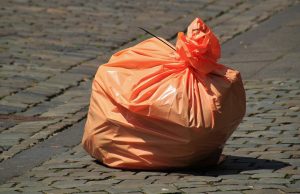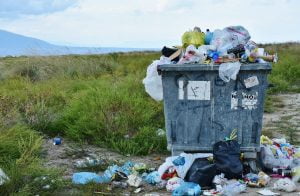 Plastic bags are one of the most common items found anywhere on the globe. It is estimated that around 2 million plastic bags are used every single minute. That’s around one trillion plastic bags every single year (To put that into perspective, there are 12 zeros in a trillion!).
Plastic bags are one of the most common items found anywhere on the globe. It is estimated that around 2 million plastic bags are used every single minute. That’s around one trillion plastic bags every single year (To put that into perspective, there are 12 zeros in a trillion!).
Plastic bags are an abomination; an unnatural health hazard that is currently polluting a huge percentage of our planet, and yet, they continue to be used by individuals and businesses alike. Here are the top 5 harmful effects of plastic bags.
Plastic bags do not decompose
 Plastic is an unnatural product. Made from petroleum and chemicals in huge factories which are themselves releasing tons of harmful gases every single day. Most plastic bags are single-use, and once their purpose is complete, they get thrown into the garbage bin. From the trash can, they move into a garbage truck, on their way to landfills where they simply pile up one over the other as years pass by.
Plastic is an unnatural product. Made from petroleum and chemicals in huge factories which are themselves releasing tons of harmful gases every single day. Most plastic bags are single-use, and once their purpose is complete, they get thrown into the garbage bin. From the trash can, they move into a garbage truck, on their way to landfills where they simply pile up one over the other as years pass by.
Since they don’t decompose, they’re just going to keep building up to larger piles, filling up space that could have been used more productively, there’s simply no end to it! So the next time you think of casually throwing out a plastic bag, know that it will wander around the streets or landfills for up to 300 years.
Release toxic chemicals on incineration
 As plastics do not decompose, they fill up landfills, causing massive amounts of space to be occupied. Therefore, many landfills choose to incinerate the plastic in order to get rid of it, which brings us to probably one of the most harmful effects of plastic bags. As plastic is made from petroleum, and bound together with certain harmful chemicals, burning plastic bags means these chemicals can now easily react with the air to form highly toxic fumes. These toxic fumes contain mercury, dioxins, and phthalates. The fumes pose an imminent threat to not just humans, but also the vegetation nearby.
As plastics do not decompose, they fill up landfills, causing massive amounts of space to be occupied. Therefore, many landfills choose to incinerate the plastic in order to get rid of it, which brings us to probably one of the most harmful effects of plastic bags. As plastic is made from petroleum, and bound together with certain harmful chemicals, burning plastic bags means these chemicals can now easily react with the air to form highly toxic fumes. These toxic fumes contain mercury, dioxins, and phthalates. The fumes pose an imminent threat to not just humans, but also the vegetation nearby.
Mercury is an extremely dangerous metal that can even seep through the skin when touched. The fumes, if inhaled can be toxic to the immune system, the lungs, and even the kidneys. Prolonged exposure to mercury can be fatal, and if you’re standing near burning plastic, you’re potentially playing with death!
 Dioxins are toxic organic chemicals that can easily be absorbed by humans through inhalation, by vegetation such as crops, and even the water. These chemicals can also be transferred to the body by eating the infected fruits and vegetables and target the respiratory system as well as increase the risk of cancer.
Dioxins are toxic organic chemicals that can easily be absorbed by humans through inhalation, by vegetation such as crops, and even the water. These chemicals can also be transferred to the body by eating the infected fruits and vegetables and target the respiratory system as well as increase the risk of cancer.
Phthalates are compounds added to plastic to increase their flexibility and softness, and in the case of plastic bags, extra flexibility and softness mean an increased number of phthalates being added. When burned, phthalates can cause a number of health issues, including an increased risk of infertility and even asthma.
Harms the wildlife
Another harmful effect of plastic bags is the damage that it brings to the wildlife, whether it be air, land, or sea. Although plastic in general overall causes major damage to wildlife, plastic bags are potentially fatal in most cases.
 Birds, especially seabirds, are often found dead with their stomachs filled with bits of plastic bags or their throats choked up with entire plastic sheets. BiologicalDiversity.org claims that over 60 percent of the bird species have ingested plastic bags, with hundreds of birds dying each year due to this very reason. It is also estimated that in 2050, the percentage of bird species to have eaten plastic would have reached over 99 percent.
Birds, especially seabirds, are often found dead with their stomachs filled with bits of plastic bags or their throats choked up with entire plastic sheets. BiologicalDiversity.org claims that over 60 percent of the bird species have ingested plastic bags, with hundreds of birds dying each year due to this very reason. It is also estimated that in 2050, the percentage of bird species to have eaten plastic would have reached over 99 percent.
Land animals are no exception to this. Plastic bags are especially a concern for stray animals who get themselves entangled in them, or often suffocate to death if their mouth gets covered by one of these bags. However, the damage caused to them is nowhere close to what marine life is experiencing.
 Perhaps the greatest victim of plastic bags in the wildlife is the ones living under the sea. Plastic is the greatest pollutant of the oceans, and with tons of plastic bags being dumped into the oceans every day, it is endangering the lives of hundreds of species of marine animals. The number of plastic bags in the oceans is so great that around 2400 tons of them are ingested by fish each year, causing them to suffer and die.
Perhaps the greatest victim of plastic bags in the wildlife is the ones living under the sea. Plastic is the greatest pollutant of the oceans, and with tons of plastic bags being dumped into the oceans every day, it is endangering the lives of hundreds of species of marine animals. The number of plastic bags in the oceans is so great that around 2400 tons of them are ingested by fish each year, causing them to suffer and die.
Even the large marine mammals are not safe, as beached whales are often found dead after ingesting several kilograms of plastic. Due to the intense currents, plastics often break down into smaller bits, which are even more dangerous for smaller species of fish who unknowingly swallow them while passing by and die.
Harmful for the vegetation
 Although one would not expect vegetation to be affected by plastic bags, the reality is quite the opposite. As previously mentioned, plastic bags when incinerated can release a number of harmful chemicals that are absorbed by the nearby water supply and vegetation. When the vegetation absorbs these toxins or is sprayed with the contaminated water, they actually alter the soil chemistry, causing water to evaporate more quickly, leaving the soil dry and allowing more contaminants and toxins to enter into the soil. The contaminants within the soil are absorbed by the roots, contaminating the entire crop,
Although one would not expect vegetation to be affected by plastic bags, the reality is quite the opposite. As previously mentioned, plastic bags when incinerated can release a number of harmful chemicals that are absorbed by the nearby water supply and vegetation. When the vegetation absorbs these toxins or is sprayed with the contaminated water, they actually alter the soil chemistry, causing water to evaporate more quickly, leaving the soil dry and allowing more contaminants and toxins to enter into the soil. The contaminants within the soil are absorbed by the roots, contaminating the entire crop,
Made of fossil fuels
 Apart from all other harmful effects of plastic bags mentioned in the article, one thing that remains above all is that plastic bags are made from fossil fuels, an ingredient that is proven to harm the environment in multiple ways. Not only does burning plastic cause a huge amount of carbon to be released into the atmosphere, but also the process of extracting and refining petroleum itself is a process that causes immense harm to the environment and its inhabitants. Fossil fuels are already causing enough problems to our planet, and the increased use of plastic over the past few decades has not done us any favours.
Apart from all other harmful effects of plastic bags mentioned in the article, one thing that remains above all is that plastic bags are made from fossil fuels, an ingredient that is proven to harm the environment in multiple ways. Not only does burning plastic cause a huge amount of carbon to be released into the atmosphere, but also the process of extracting and refining petroleum itself is a process that causes immense harm to the environment and its inhabitants. Fossil fuels are already causing enough problems to our planet, and the increased use of plastic over the past few decades has not done us any favours.
What now?..
 Over the past few years, companies and individuals are recognizing the harmful effects of plastic bags on the environment and have started working on offering eco friendly alternatives that may help reduce the damage that plastic bags are currently causing to the environment. An example of this is the increased use of products made from bioplastic and biodegradable plastic, which have also helped increase in production of alternatives to plastic bags.
Over the past few years, companies and individuals are recognizing the harmful effects of plastic bags on the environment and have started working on offering eco friendly alternatives that may help reduce the damage that plastic bags are currently causing to the environment. An example of this is the increased use of products made from bioplastic and biodegradable plastic, which have also helped increase in production of alternatives to plastic bags.
The plastic problem is a huge one, and we know that it won’t be gone at least for the next few years. However, we can show our contribution by trying to limit plastic in our lives as much as possible. Try to use alternatives to plastic, start looking at sustainable plastic alternatives such as biodegradable containers and sustainable garbage bags. Removal of plastic bags from your life is not a one-day job, but a lengthy process that requires persistence. Little by little, we can surely help reduce the damage that we have inflicted upon ourselves and the planet.
